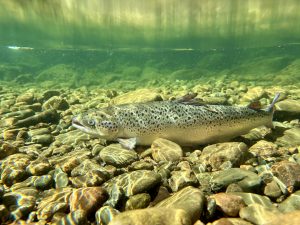Seafood Watch defines sustainable seafood as originating from sources, whether fished or farmed that can maintain or increase production in the long-term without jeopardizing the structure or function of affected ecosystems.
This is a noteworthy milestone for our industry, as this marks the first time ocean-raised salmon has earned this recommendation from the Monterey Bay Aquarium’s Seafood Watch program, which many consumers use to make choices about what seafood they eat.
Atlantic Canadian salmon farmers have been advocating for many years that the Monterey Bay Aquarium should update its Seafood Watch Science Assessment process and remove ocean raised farmed salmon from the red “avoid” list. While Seafood Watch put Atlantic Canadian salmon in the “Good Alternative” yellow range on some criteria, three other criteria were in the red, which unfortunately dropped the entire species.
The salmon farming industry has changed dramatically in the past five to 10 years and has invested significantly in innovative solutions to farming challenges. Some of the data used in the review of Canadian ocean-raised salmon is considerably outdated. We believe the rating for Atlantic Canadian farmed salmon will be improved once current data is adequately described and considered by Seafood Watch. Our industry welcomes ongoing dialogue with the Monterey Bay Aquarium on its review of our sector in Atlantic Canada. We’re hopeful that in the future we will see our Atlantic Canadian farmed salmon moved to the “Good Alternative” list.
Whether it’s grown in Maine or Atlantic Canada, farmed Atlantic salmon is a smart, nutritious and delicious food choice, naturally low in saturated fat and a lean source of protein. The American, Canadian and international Heart and Stroke Foundations all recommend eating fish, especially fatty fish like Atlantic salmon, at least twice a week. We know our customers will continue to seek out farmed Atlantic salmon from our region for its freshness and quality, and the responsible manner in which it is grown. In addition to following both federal and provincial regulations, all Atlantic Canadian salmon farming companies are involved in third-party certification programs to ensure the salmon is sustainably produced and of the highest quality.
Related Stories
